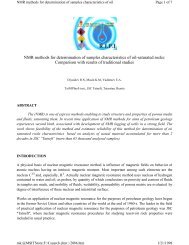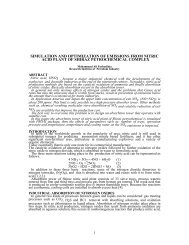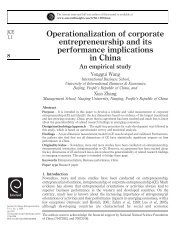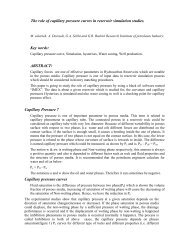Corporate entrepreneurship: teaching managers to be entrepreneurs
Corporate entrepreneurship: teaching managers to be entrepreneurs
Corporate entrepreneurship: teaching managers to be entrepreneurs
Create successful ePaper yourself
Turn your PDF publications into a flip-book with our unique Google optimized e-Paper software.
JMD22,4336(2) Is it <strong>be</strong>tter <strong>to</strong> try and identify people within the company who alreadyhave entrepreneurial leanings, or can any competent, motivated managerlearn <strong>to</strong> act and think like an entrepreneur?(3) Is corporate <strong><strong>entrepreneurs</strong>hip</strong> really an oxymoron? Can people actually<strong>be</strong> trained and then allowed <strong>to</strong> act like start-up <strong>entrepreneurs</strong> within analready, well-established company. Or, as stated <strong>be</strong>fore, are there <strong>to</strong>omany corporate antibodies in place <strong>to</strong> allow such a phenomenon?(4) If there are such antibodies at work, how do large companies learn <strong>to</strong>identify and overcome them?(5) Finally, is there a real return on investment in such educationalendeavors? Do any new, truly entrepreneurial ventures come <strong>to</strong> fruitionthat justify both the program’s expense and the <strong>managers</strong>’ time awayfrom other potentially more productive and certain activities? Ultimately,will increased entrepreneurial <strong>be</strong>havior actually lead <strong>to</strong> the capturing ofhigher margin, durable new business opportunities by the company?Summary of findingsFor purposes of confidentiality, the author has chosen <strong>to</strong> consolidate thegeneral findings from these four companies. Several sources of data served as afoundation for the following results. First, many of these programs haverequired that participants develop full-blown business plans and then competewith others in front of an executive team for resources and support. Thus, thereis some hard data regarding business plans that have actually developed in<strong>to</strong>successful businesses. We also have feedback from senior management, HRrepresentatives and the participants themselves as <strong>to</strong> how much they actuallylearned and could apply within their own businesses. While there are somecompany specific differences in results, the degree of similarity in the findingswas impressive.Nature v nurturePerhaps the first question is the most critical one for companies considering<strong>teaching</strong> <strong>managers</strong> <strong>to</strong> <strong>be</strong> <strong>entrepreneurs</strong>. We now <strong>be</strong>lieve, <strong>be</strong>yond any doubt,that much of what start-up <strong>entrepreneurs</strong> do can <strong>be</strong> taught <strong>to</strong> relativelyordinary but motivated individuals. So what do start-up <strong>entrepreneurs</strong> knowand do that can potentially <strong>be</strong> learned by others?Start-up <strong>entrepreneurs</strong> do three things very well. They identifyopportunities, shape and develop these opportunities, and then they create abusiness structure <strong>to</strong> turn these opportunities in<strong>to</strong> successful businessventures. The starting point is an idea that is new. This new idea could <strong>be</strong>revolutionary or evolutionary and it might not even <strong>be</strong> theirs, but there issomething different about it. Start-up <strong>entrepreneurs</strong> then <strong>be</strong>gin <strong>to</strong> learn aboutthis idea <strong>to</strong> see if is just an idea or an opportunity. They change it, shape it,modify, and sometimes discard it for something <strong>be</strong>tter. Once they are satisfied
















